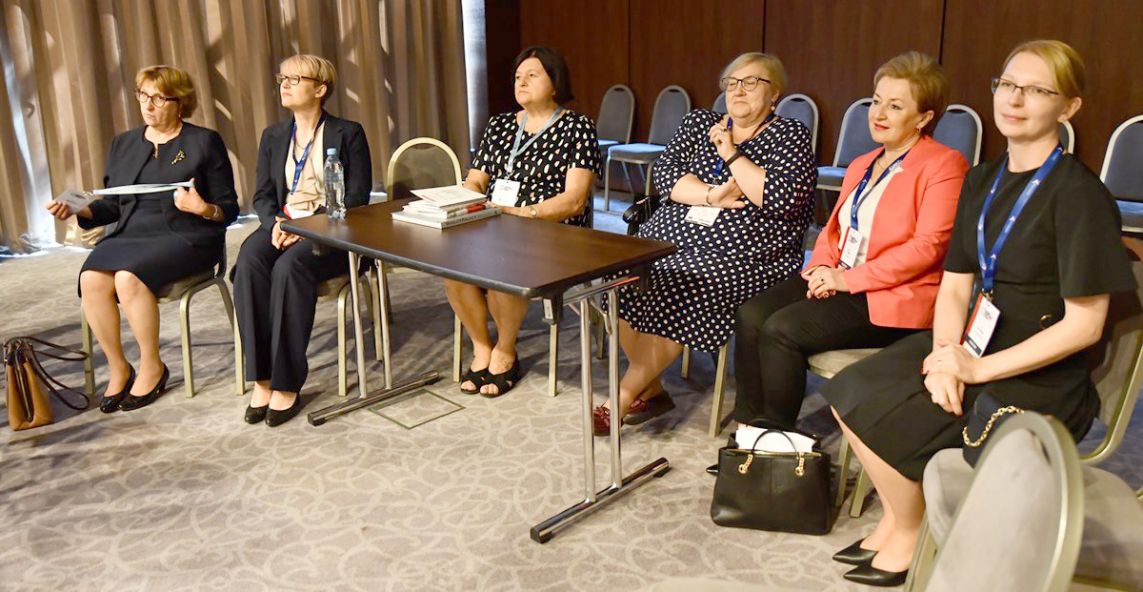- July 18, 2023
- 186
K. Dzierżyńska: The most important thing is that our common bond is the native language

Ilona Lewandowska interviews Krystyna Dzierżyńska, the president of the “Macierz Szkolna” Association of Polish School Teachers in Lithuania, about the First World Congress of Polish Education and Science Abroad.
From July 5th to July 9th, 2023, you participated in the First World Congress of Polish Education and Science Abroad. The St. Maximilian Maria Kolbe Institute of Polish Language Development organized this event. What are your observations after this event?
The Congress was a huge event and gathered around 500 representatives of Polish education from all over the world. The event was a significant success both in terms of organization and the program. The main focus of the Congress was the important task of preserving and shaping our national identity and ensuring the continuity and preservation of the Polish language. Participants included teachers, leaders, and representatives of Polish organizations abroad, as well as parents of students attending Polish educational institutions abroad and representatives of universities beyond Poland’s borders. The challenge varies depending on the circumstances, with Polish schools in different countries facing different situations. While in some countries, weekend or Sunday schools might not have professionally trained teachers. They are led by individuals who simply know the Polish language and work to promote it. It is different for Polish schools in the diaspora and in Lithuania, where Polish schools operate within the framework of the Lithuanian education system. Despite the variations, the common bond that resonated strongly at the Congress was the native language shared by everyone present. Representatives from countries like Brazil highlighted the significance of this shared language. They even in the 5th or 6th generation outside of Poland, have not forgotten their native language. Even though they may speak it with a distinct accent. They emphasized that their children are also learning Polish. While the needs and functioning of various Polish schools and educational systems may differ, the unity created by the native language remains the most crucial aspect.
What new proposals did Congress put forward to support Polish education outside the country?
I am delighted that during the congress, it was strongly emphasized that the well-being of all educational centers is essential. Not only those of the Polish diaspora but also centers like ours, schools operating within state education systems. It was also announced that greater attention will be given to young people in the future. Encouraging them to actively participate in organizations formed in various parts of the world, promoting the development of scouting, sports clubs, and more. All participants accepted a proposal to organize the First World Festival of Polish Youth from Abroad in Poland in 2024. There is no doubt that we must invest in young people and pass on to them what our fathers passed on to us. The idea of establishing closer cooperation with educational, museum, and scientific institutions in Poland was also discussed. The panels dedicated to genealogy were very interesting. It turns out that tracing one’s ancestors is not as difficult as it may seem, and in many cases, we can uncover the history of our families up to 5 or 6 generations. As for the participants’ demands, they all emphasized that for the effective functioning of educational institutions, there needs to be a faster and more efficient transfer of funds for their operation. Representatives of Polish institutions demonstrated understanding and pledged to expedite the allocation of funds compared to this year. The congress recommendations emphasized adjusting the deadlines for competition procedures and financial disbursements to fit the school year. Many individuals with influence over supporting Polish education abroad were present. There appeared Minister Przemysław Czernek, Minister Jan Dziedziczak, and directors of important institutions such as NAWA and ORPEG.
A sizable delegation from Lithuania participated in the congress. Did you present any specific demands of your own?
Indeed, there were many participants from Lithuania. Our needs differ; currently, our main concern is textbooks in the Polish language adapted to our curriculum. We emphasized the tremendous value of trips to Poland for our students and the importance of fostering connections with their peers in the country. These experiences bring significant benefits and are relatively easy to organize due to the proximity. We had the opportunity to share the specifics of our schools in smaller groups during the congress. Each participant expressed their areas of interest when applying to attend the event. I took part in discussions with a group of presidents and leaders of social organizations. There were separate discussions for Polish language teachers and other groups. A particularly pleasant moment for us was the visit to Polish Television. Where TVP Wilno showcased highlights from our school events. The materials received great interest from participants from different countries. Additionally, receiving the Honorary Badge “Meritorious for Polonia and Poles Abroad” was essential for us as it acknowledged the efforts of the “Macierz Szkolna” Association. Prime Minister Mateusz Morawiecki presented the badge during the congress, represented by Minister Jan Dziedziczak. Overall, we look to the future with hope, and the congress was a truly enriching experience.
Source: TVP Wilno/Ilona Lewandowska, Photo: Participants of the congress.
Translated by Agnieszka Julia Olchowik within the framework of a traineeship programme of the European Foundation of Human Rights, www.efhr.eu.

